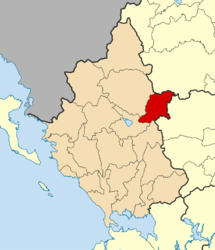Metsovon
|
Metsovo Μέτσοβο |
|
|---|---|

Panorama of Metsovo.
|
|
| Coordinates: 39°46′N 21°11′E / 39.767°N 21.183°ECoordinates: 39°46′N 21°11′E / 39.767°N 21.183°E | |
| Country | Greece |
| Administrative region | Epirus |
| Regional unit | Ioannina |
| Area | |
| • Municipality | 363.7 km2 (140.4 sq mi) |
| • Municipal unit | 177.7 km2 (68.6 sq mi) |
| Elevation | 1,160 m (3,810 ft) |
| Population (2011) | |
| • Municipality | 6,196 |
| • Municipality density | 17/km2 (44/sq mi) |
| • Municipal unit | 3,469 |
| • Municipal unit density | 20/km2 (51/sq mi) |
| Community | |
| • Population | 2,503 (2011) |
| • Area (km2) | 101.9 |
| Time zone | EET (UTC+2) |
| • Summer (DST) | EEST (UTC+3) |
| Postal code | 442 00 |
| Area code(s) | 26560 |
| Vehicle registration | ΙΝ |
| Website | metsovo.gr |
Metsovo (Greek: Μέτσοβο) is a town in Epirus, in the mountains of Pindus in northern Greece, between Ioannina to the north and Meteora to the south.
The largest centre of Aromanian life in Greece, Metsovo is a large regional hub for several small villages and settlements in the Pindus region, and it features many shops, schools, offices, services, museums, and galleries. The economy of Metsovo is dominated by agriculture and tourism, the latter of which flourishes in winter.
Metsovo is served by Greek National Road 6 (Ioannina – Trikala) and by the Egnatia Odos motorway.
From medieval times till well into the 19th century, Metsovo was known, in various sources, as Metzovo. From the end of the 18th century on, the literary form of Messovon makes its appearance. The town is known as Aminciu in Aromanian, or Vlach, and as Miçova in Ottoman Turkish.
In the Ottoman census records we see the word Mcwh, which is usually pronounced "Miçova". In the Vlach language Metsovo is called Aminʤu, a word combining the preposition "a"— meaning "to, into"—and the word "Minʤu".
From "Minʤu" derive terms signifying ethnic origin Miʤanu and Miʤanə—meaning, respectively, "man from Metsovo", "woman from Metsovo"—as well as the adjectives miʤənescu and miʤəneascə—meaning "Metsovite", "of Metsovo"—which are used today by the residents of Metsovo. The Vlach-speaking part of the population, that part which does not use the term Aminʤu, uses the name "Meʤova". Some firman refer to Metsovo as Derveni.
The derivation of the name Metsovo—from the words Mitsous and Mesovounon or from the unattested Slav word *Mẹčovo, meaning bear-place—which has been proposed by academics and historians, is not confirmed by linguistic research. On the contrary, there appears to be an etymological relation between the Vlach Minʤu and the Greek Metsovo, the latter being a combination of the stem Mets and the Slavic-ending ovo.
...
Wikipedia


